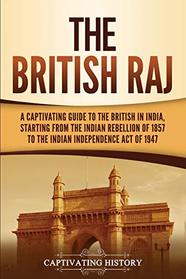This is an eye-opening study of the effects of the British in India. Although familiar with the East India Company (because of the books I've read through Captivating History), this book gives the 'bigger picture' of the British association with the Indians. It is not a pretty picture. Income from India paid for England's Industrial Revolution. The GDP (Gross Domestic Product) numbers of both countries rose because of their association.
However, the culture and religions of India took a hit from the dismissive posture of the British.
The many famines in India are truly appalling. The British viceroy was disdainful of the plight of the people he oversaw. At that time, British merchants were converting farms (providing food for locals) to providing more land to grow things for the British market. When famines occurred, because of bad harvests or poor weather conditions, the British didn't concern themselves with the consequences. Millions died of starvation.
Florence Nightingale was in India and stated that it was a lack of transportation that caused famines. There was no way to get extra foodstuffs from successful farms to areas of famine. She was not shy about other injustices she saw her fellow citizens committing in India. The shocking thing was that there were plenty of trains to transport extra food to needed areas, but the British merchants hogged up the transport to get their products out of the country or the military used it for their purposes.
This book brings out the fact that India wasn't a nation, but multiple cultures and religions living side-by-side. The splitting of Bengal caused a nationalistic wave of enthusiasm to cover India. The story of Mahatma Gandhi was particularly interesting and compelling. Gandhi's Salt March laid the foundation for India's independence and the repetition of nonviolent protests around the world by future leaders.
However, the culture and religions of India took a hit from the dismissive posture of the British.
The many famines in India are truly appalling. The British viceroy was disdainful of the plight of the people he oversaw. At that time, British merchants were converting farms (providing food for locals) to providing more land to grow things for the British market. When famines occurred, because of bad harvests or poor weather conditions, the British didn't concern themselves with the consequences. Millions died of starvation.
Florence Nightingale was in India and stated that it was a lack of transportation that caused famines. There was no way to get extra foodstuffs from successful farms to areas of famine. She was not shy about other injustices she saw her fellow citizens committing in India. The shocking thing was that there were plenty of trains to transport extra food to needed areas, but the British merchants hogged up the transport to get their products out of the country or the military used it for their purposes.
This book brings out the fact that India wasn't a nation, but multiple cultures and religions living side-by-side. The splitting of Bengal caused a nationalistic wave of enthusiasm to cover India. The story of Mahatma Gandhi was particularly interesting and compelling. Gandhi's Salt March laid the foundation for India's independence and the repetition of nonviolent protests around the world by future leaders.




